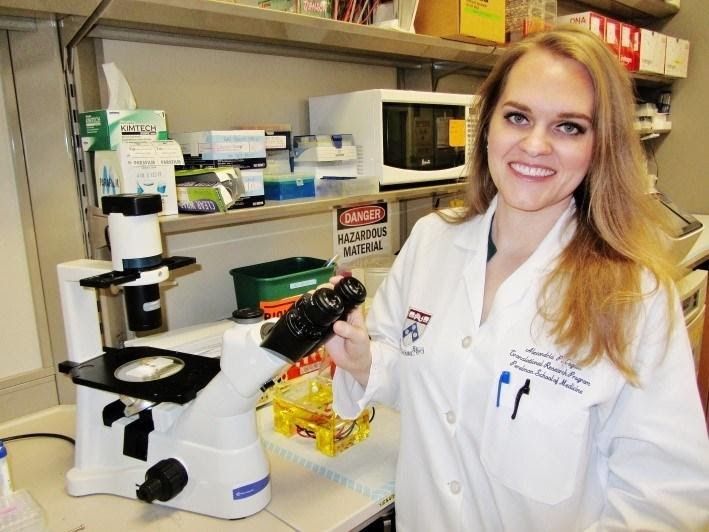
Alexandria (Alex) Cogdill is a PhD CPRIT scholar and strategy fellow at the University of Texas MD Anderson.
According to Alex, you should take these five steps to successfully approach a career in research:
1) Explore your interests while in school by taking classes across a number of STEM and non-STEM disciplines. Scientific and medical research is a huge enterprise that encompasses thousands of career paths, so you need to take time to explore! Taking a variety of classes will be helpful in learning about cutting edge work and give you the chance to discover what you are passionate about and how you can utilize your strengths to contribute to the research field. There are many exciting opportunities in research, so talk to your professors and senior students about your interests to find your best fit.
2) Utilize online professional websites, such as GenHERation®, Indeed, and LinkedIn. Determine what primary responsibilities you might have in different roles across scientific, medical, biotechnical, or regulatory roles, among others. Then, use LinkedIn or your school’s alumni directory to find professionals who have those exciting roles that interest you and explore their career journeys. Look at college majors, extracurriculars, internships, and job experiences. Once you do your research, reach out to people to conduct informational interviews, which will allow you to gain valuable insights and grow your network.
3) Try to get experience in some sort of research or clinical capacity. Whether you shadow a scientist, volunteer in the hospital, or participate in a summer research program hosted by a university, the earlier you start building your CV the better. How can you gain access to these experiences? Email labs, join STEM student groups, utilize your university or high school career center, and apply for summer internship programs. When you begin to pursue a career in research, you are not going to know every step to take and that is okay! As long as you remain curious and ask questions to people who have already pursued a similar career path, you are on the right track.
4) Develop the key soft and hard skills that will be required for any research job. From my experience, you need to master the following skills to excel in the field: working on a team, excellent time management, effective written and oral communication, and project management.
5) Ask a lot of questions! Effective communication is key when you pursue a career in research. This means you will have to get very good at asking and answering focused and actionable questions as a member of the research and medical community. To learn how to do this, attend research and clinical seminars. Learn from the experts! You should also read scientific and popular press articles and then talk about them to others.
Alexandria (Alex) Cogdill is a PhD CPRIT scholar and strategy fellow at the University of Texas MD Anderson. Alex completed her Bachelor’s degree, in Biology, at The University of North Carolina, Pembroke and her Master’s in Bioengineering at the University of Pennsylvania. Prior to joining UT MD Anderson as a PhD student, Alex worked at the National Institutes of Health (NIH), Harvard Medical School, the Massachusetts General Hospital, and the University of Pennsylvania. Over the past 10 years, she has published over 50 scientific articles in the oncology space and has garnered >8,000 citations. In addition to her research proficiencies, Alex has significant management and corporate development experiences that have been pivotal to leading and launching successful projects across the drug discovery value chain.
Most recently, Alex’s research has focused on investigating the role of the gut microbiome in patient response to cancer therapy (you are what you eat). After focusing on patients in the United States, Alex was awarded an international research grant from the US State Department to examine the global implications of her work. As a Fulbright Research Grantee from August 2019 to July 2020, Alex lived in Paris, France working at the Insitut Gustave Roussy; the largest cancer center in Europe. During this time, in collaboration with 19 countries and ~25,000 patient samples, Alex and the lab explored a number of questions related to improving patient response to cancer therapy. Her work resulted in a number of publications and international presentations.



Comments (0)